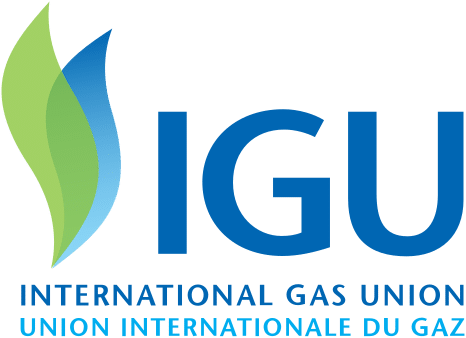Press release issued by the Secretariat of the International Gas Union (IGU)
Natural Gas Increases Energy Market Stability, Reduces CO2 Emissions and Improves Quality of Life
Oslo, 12 November 2014 – The World Energy Outlook (WEO-2014) released by the International Energy Agency (IEA) underlines the central role of natural gas in the energy mix. The global share of natural gas is expected to grow from 21% of the global energy mix in 2012, to 24% in 2040. IGU President, Jérôme Ferrier, is confident about the positive role natural gas will play: “The growth of natural gas will increase energy market stability, reduce CO2 emissions and improve quality of life wherever it is used. To secure this expanding role, the natural gas sector will continue to invest, innovate and gain public acceptance.”
Security of supply: gas connects global markets.
The IGU is encouraged by what the WEO-2014 calls the “growing cast of gas suppliers” as it brings more stability and diversity of supply sources to the energy markets. The WEO-2014 concludes that, unlike oil, gas supplies will continue to come from a large pool of countries that all have significant production.
LNG is now clearly recognized as a key enabler in connecting markets, with countries like Australia, Canada, USA, Mozambique and Tanzania joining the ranks as important LNG exporters. On gas trade flows the WEO-2014 concludes that: “the greater diversity and flexibility of gas trade flows, particularly of LNG, do represent important gains for gas security in this evolving landscape.” The IGU is upbeat about the benefits of LNG and points to the investments made by industry. In data presented by the IGU earlier this year, liquefaction capacity is set to increase substantially between 2020 and 2025. Also, re-gasification capacity is projected to rise significantly (estimated at 75%).
The WEO-2014 further reports that in 2040 unconventional supplies will account for 60% of the growth in, and a 31% share of, natural gas production. Countries like Australia, China, India and Argentina are projected to invest substantially in these unconventional resources. The IGU calls upon governments – especially in Europe – to work with industry to develop operational and regulatory approaches that ensure that these unconventional resources are developed in an environmentally responsible manner.
“The global gas industry is rapidly evolving,” says IGU President, Jérôme Ferrier. “I have no doubt that our investments in on- and offshore production, LNG and natural gas infrastructure will lead to more security of supply.”
Quality of life: gas replaces coal to reduce CO2 and improve air quality.
The power sector is the single largest area of growth for gas demand. The WEO-2014 states: “Gas is well placed to enjoy a competitive advantage over many other fuels for power generation, given its higher efficiency, greater flexibility, lower capital costs and shorter plant construction times”. IGU Secretary General, Torstein Indrebø, underlines the benefits of gas and points to the role of gas in developing renewables: “Natural gas is a great partner for renewables, because it can offer a flexible, on-demand and economic solution for their intermittency.”
There is more good news, especially in the area of global emissions. According to the WEO-2014, natural gas is set to overtake coal in power generation for OECD countries around 2025. This shift will help reduce CO2 emissions from power generation. Using natural gas for power generation reduces emissions by 50% versus that of coal. Natural gas powered generation also has far lower NOx, SOx and particulate emissions than coal. This is evidenced by China’s move away from coal power to gas power in order to clean the air in its major cities.
On the other hand, the WEO-2014 reports that coal remains the favoured fuel for power generation by Non-OECD countries due to less stringent environmental standards and cheaper supplies. Even in Europe, cheap coal and a badly functioning carbon market compromise long-term stabilization of CO2 emissions as gas powered plants stand idle. The IGU therefore supports climate policies that introduce a cost of carbon that is uniform and predictable across economies, is technology-neutral, ensures global participation and drives the innovation of low carbon technologies.
The role of gas: investment, innovation and public acceptance.
Despite the important role of gas in the energy mix, the industry can never be complacent. IGU Secretary General, Torstein Indrebø, notes: “We must provide answers to the questions of tomorrow.” The IGU sees three areas of focus for its members in the coming years:
- Investment: continue to invest in the production, transportation and distribution of gas to connect markets and further diversify the world energy supply mix.
- Innovation: continue to develop new sustainable solutions, such as LNG technologies that are more efficient, green gas projects that reduce CO2, the use of gas in transport or shipping that reduce local emissions, and better stewardship in production to reduce flaring and methane leakage.
- Public acceptance: the social licence to grow challenges all energy infrastructure developments, including the natural gas sector, well beyond commercial and technical skills. Therefore the IGU encourages the natural gas industry to step up efforts for broader public acceptance.
Natural gas has a key role in the world energy mix, stabilizing the market, reducing CO2 emissions and improving quality of life. In turn, the natural gas industry has to focus on investment, innovation and public acceptance.
###
For more information
Dimitri Schildmeijer (contact on behalf of the Press Secretary of the IGU) at +32 486 439063 or by e-mail: dimitri@schildmeijer.eu
